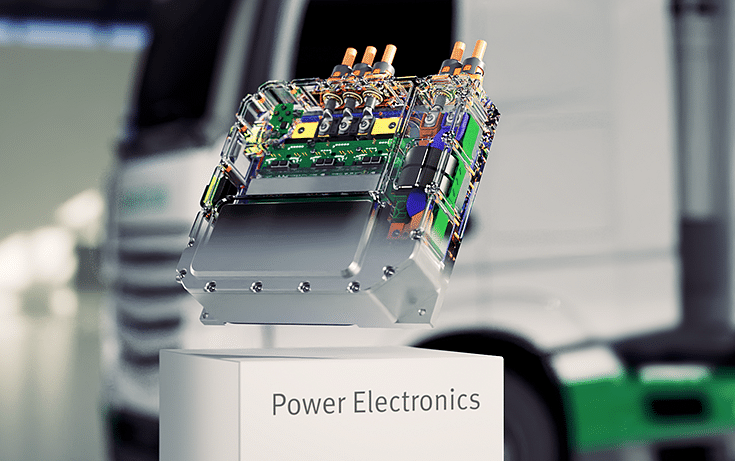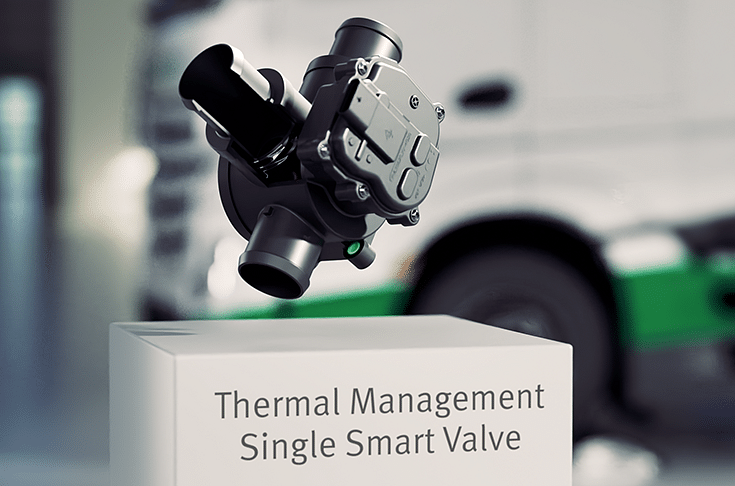Schaeffler to showcase innovations for electric CVs at IAA Transportation
Develops high-performance electric motors, 800-volt power electronics with weight and cost savings, and innovative thermal management system for shorter charging times
Schaeffler is developing high-voltage technology for tomorrow’s electrified light and heavy commercial vehicles. Going forward, in the EU, there will be more and more commercial vehicles with electric powertrains on the roads as truck manufacturers take steps to achieve a 15-percent reduction in CO2 emissions by 2025. Further reductions are mandated in the EU for 2030.
“Without the transportation and logistics industry on board it will not be possible to meet the world’s climate targets,” said Matthias Zink, Schaeffler’s CEO Automotive Technologies. Some 60 percent of all truck journeys are shorter than 500 kilometres and are therefore within the range achievable by battery electric trucks on a single charge. Electric trucks are also a zero-emission, low-noise goods transportation solution that will not fall foul of increasingly stringent inner-city vehicle entry restrictions. Another advantage that e-trucks have over trucks with internal combustion engines is the ability to recover energy in stop-and-go urban traffic.
To help with the transition to electrified powertrains, Schaeffler has developed a new and innovative product family of oil-cooled electric motors. These will be on display for the first time at the IAA Transportation 2022 in Hanover from September 20-25. The company will also be presenting its 800 V power electronics technology, as well as components and systems for thermal management in commercial vehicles.
New product family of electric motors, 800 V power electronics systems
Schaeffler’s new high-performance electric motors are scalable, efficient, and extremely robust. Impressively, they have an efficiency of over 97 percent and a continuous drive power output of up to 300 kW – features made possible by an innovative oil cooling system developed by Schaeffler’s electric motor specialists.
Another key feature is the wave winding technology used in the stators. Schaeffler says it is one of only a handful of companies worldwide to have mastered this new winding technology, which results in electric motors with very high power densities.
The company is developing its electric motors in various scalable series to cover all power classes cost-effectively despite the comparatively low electric drive production volumes in the commercial vehicle sector. The motors will be used in on-road and off-road vehicles, fully electric and hybrid drives, and in both electric axle and central drive configurations. They are also specially designed to meet the lifespan requirements of commercial vehicles.
Schaeffler’s first e-motors for commercial vehicles will go into production in 2023. This second product family of water-cooled 800 V motors delivers a maximum continuous output of 180 kW and generates a maximum torque of 950 newton-meters. These motors incorporate hairpin stator windings, which Schaeffler produces in-house.

To function and deliver maximum efficiency, electric powertrains also need power electronics. Schaeffler is developing power electronics units that are specifically tailored to the requirements of commercial vehicles. They are based on silicon carbide technology and designed for voltages of up to 850 V and effective currents of 600 A (peak load) and 400 A (continuous load). Occupying a volume of 12.4 litres, this technology achieves a space-saving power density of more than 40 kW per litre. All of the electrical and mechanical components are designed for the significantly higher mileages required of heavy commercial vehicles. The power electronics system can also be connected to the standard on-board vehicle power supply via a 24 V direct current connection.
Silicon carbide technology offers numerous advantages for commercial vehicle applications, including higher switching frequencies, improved heat dissipation, and high continuous output power. These advantages all add up to significantly improved electric powertrain efficiency. Simulations performed by Schaeffler show that a drive system comprising an electric motor, power electronics, and an axle drive is 2.5 percent more efficient when based on silicon carbide semiconductors in combination with an optimized gearbox than when based on conventional silicon semiconductors. In battery-electric long-haul trucks designed for a 500-kilometer range, this efficiency gain allows the truck manufacturer to reduce the battery capacity by 14 kilowatt-hours. This reduction in battery size corresponds to an 84-kilogram reduction in weight – and hence significant cost savings.
Thermal management as charging efficiency enhancer
Effective thermal management is key to improving charging efficiency and protecting the battery when charging at higher power. “It can save fleet operators money, because the shorter the charging time, the sooner the vehicle can get back on the road,” explained Jochen Schroder.

Schaeffler will be presenting its technology solutions for efficient temperature conditioning of drive systems and batteries in commercial vehicles at the IAA in Hanover. These solutions include a single smart valve regulator for decentralized coolant management. The regulator can manage individual coolant flows for the battery, power electronics, motor, or transmission. This customizable and decentralized arrangement allows truck manufacturers considerable freedom in their system architecture. It also means that different coolant regulation strategies can be configured separately for different vehicle operating conditions, such as fast-charging, cold start, city traffic, and hill-climbing. As well as this technology, Schaeffler offers integrated systems for all commercial-vehicle coolant functions. These systems comprise the coolant regulator, electric water pumps, sensors, and an intelligent controller, bringing manufacturers the benefits of compact, space-saving design.
Photos: Schaeffler (Jung von Matt)
RELATED ARTICLES
Autoliv Plans JV for Advanced Safety Electronics With China’s HSAE
The new joint venture, which is to be located strategically near Shanghai and close to several existing Autoliv sites in...
JLR to Restart Production Over a Month After September Hacking
Manufacturing operations at the Tata Group-owned British luxury car and SUV manufacturer were shut down following a cybe...
BYD UK Sales Jump 880% in September to 11,271 units
Sales record sets the UK apart as the largest international market for BYD outside of China for the first time. The Seal...






 By Autocar Professional Bureau
By Autocar Professional Bureau
 08 Sep 2022
08 Sep 2022
 11676 Views
11676 Views










 Ajit Dalvi
Ajit Dalvi




